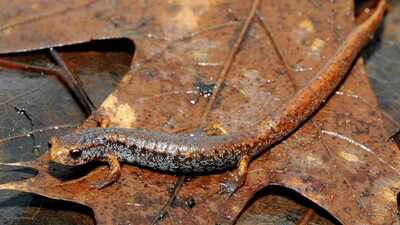Wildlife-Friendly Fall Cleanup Tips
 |
| Four-toed salamander: Provided Photo |
Autumn is here, bringing cooler temperatures, falling leaves, and shorter days. As you prepare your yard for winter, help your local wildlife with a few simple steps.
Leave the leaves
Although raking leaves seems synonymous with autumn, allowing some leaves to remain in your yard can provide benefits for plants and local wildlife. When they decompose, leaves return nutrients to the soil. In addition, fallen leaves provide cover and insulation to overwintering insects including many types of moths and butterflies.
Mow over fallen leaves to break them up and speed decomposition. Use a rake to spread out the leaves so underlying plants and grass are smothered. Excess leaves can be used as mulch in gardens and flower beds. Extras beyond that can be added to your compost bin.
Bonus: Leaving leaves in your yard can save you time in the fall, reduce the need for mulch in the spring, and keeps leaves out of landfills.
Make brush piles to help provide shelter for wildlife
During your fall clean up, make small brush piles along the edges of your yard. These piles may not seem like much to you, but they can provide shelter and insulation for many species of pollinators, birds, reptiles like turtles and snakes, amphibians like frogs and salamanders, and small mammals during the cold winter months. Especially in developed areas where natural shelter is hard to find, brush piles give wildlife a place to hide and rest.
Bonus: As the brush breaks down, it provides food for many of these animals and eventually returns nutrients to the soil.
Wait to clean up perennial plants and flower heads
Leaving your perennial beds a bit untidy can provide a boost to birds and insects. Not all birds migrate south for the winter; those that remain can survive on natural foods. Leaving flower heads on your plants can provide nutritious seeds with high fat content to birds throughout the winter. Pollinators like bees and butterflies can make use of hollow stems and other parts of the plants to overwinter.
Bonus: Using bird feeders can cause problems by attracting other types of wildlife to your yard, like bears, turkeys, and coyotes. Leaving natural areas in your yard can provide food for birds without the negative side effects of bird feeders.
Go native
Already dreaming about next year's plantings? As you plan your gardening projects over the winter, use this list of native plants to select shrubs that provide food to many types of native Massachusetts wildlife.
Tags: mass wildlife,

